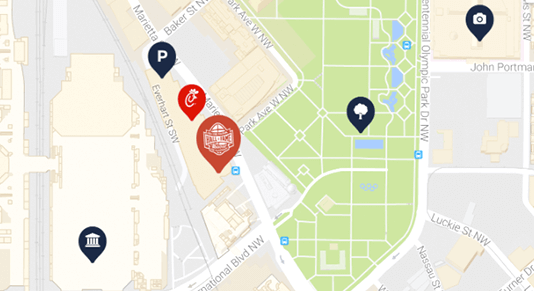August 02, 2021
American Football in the Olympics
With the 2021 Summer Olympic Games taking place in Tokyo, Japan, the College Football Hall of Fame is highlighting American football and its connection to the Olympics. While American football has never been an official medal sport in the Olympics it has been featured twice surrounding the Olympic games, in 1904 and in 1932. The sport of Rugby; A close connection, to American football has been featured in the Olympics in 1920 and 1924, with the United States winning gold in both events, with teams that largely consisted of former college football standouts and most recently in 2016 with Fiji winning the seven-on-seven version of rugby. In 1904 and 1932 American football was on display for the world to see during the Olympic games.
1904 Summer Games
Saint Louis University and Washington University in St. Louis initially sought to contest an Olympic football championship. However, they were unable to host it officially. Rather both teams ended up playing their regular seasons from teams around the country. These games were hosted at Francis Field the site of the 1904 Olympics. Only two games at Francis Field did not involve Washington: a match between Purdue and Missouri and the first match between two Indian institutions, Haskell, and Carlisle, both college football powerhouses at the time.
Date Winner Loser Score
September 28, 1904 Washington (MO) Shurtleff 10–0
October 5, 1904 Washington (MO) Rose 16–5
October 8, 1904 Illinois Washington (MO) 31–0
October 15, 1904 Sewanee Washington (MO) 17–0
October 19, 1904 Washington (MO) Drury 36–0
October 22, 1904 Indiana Washington (MO) 21–6
October 28, 1904 Purdue Missouri 11–0
October 29, 1904 Texas Washington (MO) 23–0
November 5, 1904 Washington (MO) Missouri 11–0
November 12, 1904 Kansas Washington (MO) 12–0
November 19, 1904 West Virginia Washington (MO) 6–5
November 24, 1904 Haskell Washington (MO) 47–0
November 26, 1904 Carlisle Haskell 38–4
(1904 Washington (MO) Football Team)
1932 Summer Games
Making its official Olympic debut, American football appeared as a demonstration sport in the 1932 Summer games in Los Angeles California. On the evening of August 8th, 1932, seniors for three Western universities (California, Stanford, and Southern California) were matched against the East Coast’s “Big Three (Harvard, Yale and Princeton). In front of a crowd of 60,000 spectators at the Los Angeles Memorial Coliseum, the west won 7-6. All-America selection from Southern California Gaius “Gus” Shaver from Southern California was the team captain of the West and the game’s leading rusher with 145 yards on 16 attempts. This game in combination with a similar demonstration game at the 1933 World’s Fair, led to the College All-Star game which was an important factor in the growth of professional football in the United States.
The game was originally proposed by organizers as an “intersectional” match-up between defending national champions, the University of Southern California, and Yale University. Southern California’s coach and former Yale coach, Howard Jones delivered a confidential proposal from the President of the Organizing Committee for the 1932 Summer Olympics, William May Garland, to the President of Yale University, James Rowland Angell, inviting Yale to play in the game. Following the 1929 Carnegie Report which decried various aspects of professionalism within college football, Angell reluctantly turned down the invitation. Although the schools couldn’t secure a USC vs Yale match up and determined that football would be a demonstration sport, the organized agreed on a game of all-stars who would have graduated by the Olympic games.
Like the other Olympic athletes, players for both teams lived in the Olympic Village. Several College Football Hall of Famers elected not to play in the game including All-America selection Albie Booth of Yale as well as Erny Pinckert and All-America selection from USC who had been offered paying jobs in Hollywood. Barry Wood of Harvard, another All-America selection, was selected to play in the game but reportedly declined in order to concentration on his studies.
The game was scoreless early in the fourth quarter when a field goal attempt from the East fell short. Shaver and another player from the West muffed the ball in attempt to pick it up. According to various reports, Burton Strange from the East either carried the loose ball across the goal line or simply fell on it in the endzone to give his team a 6-0 lead. Eddie Mays’ extra point kick was blocked. With three minutes left in the game Shaver scored over the right tackle to tie the game at 6-6 and Ed Kirwan’s conversion put the West in the lead for good.
(1932 Los Angeles Coliseum Home of the Olympic Games)
American Football in Future Games?
Although American football hasn’t been played since 1932, the International Federation of American Football (IFAF) has continued to petition to have the game included. In 2013, the IOC gave provision recognition to the IFAF, setting up a vote for its inclusion in the future. However, it has yet to be included as a modern game. A possible solution could be a seven-on-seven style of play, much like rugby sevens which debuted in the 2016 Olympics. The NFL and IFAF are planning to back a proposal to include flag football, a non-contact version of the game as an even in the 2028 Summer Olympics in Los Angeles.
Secure your tickets now and be apart of the legacy. Don’t miss the chance to experience greatness firsthand!
Unlock exclusive access and be part of something legendary. Join our community and enjoy premium benefits today!

